Fragile Outlook Remains After NI Tax Hike
- Business confidence remains weak following the employer NI rise, with just under half of firms (49%) expecting turnover to increase in the next 12 months
- The proportion of businesses expecting to put up prices over the next three months eases to 44% (from a spike of 55% in Q1)
- Tax remains the main concern for firms, with 56% citing it as a worry closely followed by inflation (52%)
- No significant change in sales indicators, with only 32% of business reporting a rise in sales
- A quarter (24%) of firms have cut back on investment in the past three months, while only 21% have increased investment
In the largest survey of business sentiment since April’s employer National Insurance rise, the British Chambers of Commerce (BCC) Quarterly Economic Survey for Q2, shows confidence among firms remains weak.
While price rise expectations have eased back from near historic highs in Q1 – tax remains the biggest concern cited by firms. Only a third say domestic sales have grown over the last three months.
The survey was carried out by the BCC Insights Unit and the UK wider Chamber network after the National Insurance rise came into force, with the fieldwork conducted between 12 May and 9 June. Over 4,500 businesses across the UK (93% of whom are SMEs) responded online.
Business confidence remains subdued
Levels of confidence among businesses remain weak, with only 49% of responding firms expecting their turnover to increase over the next 12 months. That’s up only slightly from 48% in Q1. This is the second lowest figure since the aftermath of the mini budget in late 2022. A fifth (20%) of businesses expect turnover to worsen and 31% expect no change.
Confidence levels remain lowest in the hospitality sector (33%) and retail (44%), showing the continued struggles these sectors face.
Profitability confidence has improved slightly but remains low. 41% of firms expect profits to increase over the next year (39% in Q1), while 28% expect them to worsen (32% in Q1).
Fewer firms planning to increase their prices
The proportion of businesses saying they expect to raise their prices in the next three months stands at 44%; down from a near-historic high of 55% in Q1. This suggests a moderation in new price rises after firms made adjustments ahead of the NICs increase. Just over half (53%) say their prices are likely to remain the same, and only 3% are expecting them to decrease.
Labour costs continue to be far and away the main cost pressure for firms, cited by 73% of respondents – the same as the previous quarter. The issue is most significant for transport and logistics businesses (88%) followed by the hospitality sector (83%).
Tax remains the biggest concern as NI rise bites
Following the employer NI contribution rise at the start of April, tax continues to be the biggest worry for businesses, although concerns have eased slightly. 56% cite tax as a worry, down from 59% in Q1. This quarter’s figure is the third highest on record, following the previous two quarters.
Concern about inflation also remains high among businesses – 52% compared with 53% in the previous quarter. Worries about interest rates continue to fall with 24% citing them in Q2, down from 28% in Q1.
No significant improvement in business conditions
The percentage of responding businesses reporting increased domestic sales has shown no noticeable improvement, 32% compared with 31% in Q1. 42% reported no change and over a quarter (26%) said they had seen a decrease in sales. Hospitality firms were the most likely to have seen a fall in sales (36%) followed by those in the retail sector (34%).
Over a quarter of businesses (26%) report an increase in cash flow over the last three months, up from 21% in the previous quarter. 30% report a fall in cash flow (down from 33% in Q1), while for 45% cash flow remained the same.
Most firms struggling to invest
As businesses face increased cost pressures, nearly a quarter, 24%, say they have cut back on investment plans (compared with 26% in Q1). 55% of firms say their investment strategy has remained the same, while only 21% have increased their plans.
The issue is more marked in certain sectors, with 39% of hospitality firms and 32% of transport firms reporting a scaling back of investment plans.
What businesses say:
“Rising employment costs, including increases in National Insurance and minimum wage, are placing significant pressure on margins – particularly for SMEs.”
Small manufacturing firm in Liverpool
“The current tax burden imposed by the UK government remains a significant challenge for businesses, particularly given the frequency of regulatory changes and the ongoing uncertainty in fiscal policy. This unpredictability makes it increasingly difficult for companies to plan ahead with confidence.”
Small services firm in Northern Ireland
“The impact of inflation and tax on the business environment is our main concern, as this impacts our clients.”
Micro services firm in Northamptonshire
“NI and NMW increases have all created increased costs. We are seeing more redundancy projects being requested to levels not seen since 2008.”
Small professional services in Suffolk
“The government missed an opportunity in the last budget to invest in business and support growth, instead taxing businesses until they are no longer viable.”
Micro manufacturing firm in the West of England
Shevaun Haviland, Director General of the British Chambers of Commerce, said:
“The rising cost of doing businesses means confidence levels remain at their lowest levels since 2022.
“However, it’s encouraging to see a drop in the number of firms planning to raise prices. Any signs of inflationary pressures easing is good news for business and the wider economy. But prices remain volatile.
“Last week, the Prime Minister acknowledged at the BCC’s Global Annual Conference that business has been asked to shoulder a huge tax burden. We now need the Government to rule out any further business taxes in this year’s Budget.
“Businesses have welcomed the series of long-term strategies from Government in recent weeks, all designed to drive forward economic growth. Our research shows businesses are stuck in a rut and more needs to be done at pace by ministers to turbocharge the economy and boost business confidence.
“Our Blueprint for Growth report provides a clear set of proposals to drive business innovation and investment. We urge ministers to work with us to implement these ideas.
“Businesses are clear – they want their costs reduced, regulation reformed, and skills barriers removed. Action by policymakers now, will help businesses out of this confidence slump and give firms the tools to boost growth.”
David Bharier, Head of Research at the British Chambers of Commerce said:
“Business sentiment in Q2 remains fundamentally subdued, following last autumn’s tax increase announcements and the more recent introduction of global tariffs.
“April’s rise in National Insurance contributions has cemented tax as the dominant concern for firms. Businesses are entering a new employment landscape marked by structurally higher labour costs and administrative requirements, fuelling increased anxiety about redundancies.
“While there has been some easing in our price expectations indicator, this follows a spike to near historic highs in Q1 and may indicate that firms already baked in the recent NICs increase. Inflation is likely to remain volatile in the short term, as any escalation in global conflict could trigger renewed shocks to commodity and shipping prices.
“SMEs are operating in an increasingly unpredictable world and have limited capacity to absorb further disruption. A meaningful improvement in business conditions will depend on a roadmap to ease the tax and admin burden, de-escalation of geopolitical tensions, implementing improvements to the UK-EU trading deal, and further mitigation of US tariffs.”



